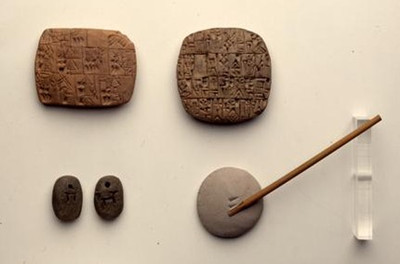Beer was the staple drink in Mesopotamia and was issued as rations to workers.
啤酒是美索不達米亞的主要飲料,用以分配給工人飲用。
Money, laws, trade, employment; this is the stuff of early writing, and it's writing like the writing on this little tablet that changes the nature of state control and state power-bureaucratic and economic.
金錢、法律、貿易、雇傭:這些便是早期寫作的內容。 如本節中寫字板般的記錄,最終改變了國家管理與政府權力的本質。
Only later does writing move from rations to emotions; the accountants get there before the poets.
到后期,文字的作用才從記錄變為抒情,這也就是說,會計師掌握書寫的年代遠比詩人更早。
It's all thoroughly bureaucratic stuff, and so we asked Gus O'Donnell, the head of the British civil service, to talk to us about why he thinks the first writing in Mesopotamia was about organising the state:
文字是徹頭徹尾的行政系統的產物。我曾為此詢問英國內閣秘書長格斯奧唐奈爵士的看法:
"This tablet is amazing. You've got a civil service here, starting to come into place in order to record what's going on.
這塊寫字板是對文字的最早記錄,同時,它也能讓我們了解早期國家的發展,當時巳有公務人員開始記錄正在發生的事。
Here is very clearly the state paying some workers for some work that's been done, they need to keep a track of the public finances, they need to know how much they've paid: it needs to be fair."
很明顯,這里記錄的是國家向工人分發工作報酬。他們需要將公共財政的支出記下來,并了解付出的酬勞有多少,這些都要秉公處理。
So, by 3000 BC, the people who had to manage the various city-states of Mesopotamia were discovering how to use written records for all kinds of day-to-day administration, keeping large temples running or tracking the movement and storage of goods.
公元前三千年,美索不達米亞各個城邦的管理者發現了如何將文字記錄運用到日常管理,運用到大型廟宇的運作、活動記錄以及貨物儲存中的方法。
Most of the early clay tablets in our collection, like this one, come from the city of Uruk, roughly halfway between modern Baghdad and Basra.
大部分的早期黏土板,如本節中的這塊,都來自今巴格達與巴士拉之間的烏魯克。
Uruk was just one of the large rich city-states of Mesopotamia that had grown too big and too complex for anyone to be able to run them just by word of mouth. Gus O'Donnell again.
烏魯克是美索不達米亞的大型富庶城邦之一,城市已經發展得過于龐大復雜,無法僅靠口頭表達來進行統治。奧唐奈爵士再次解釋道。












